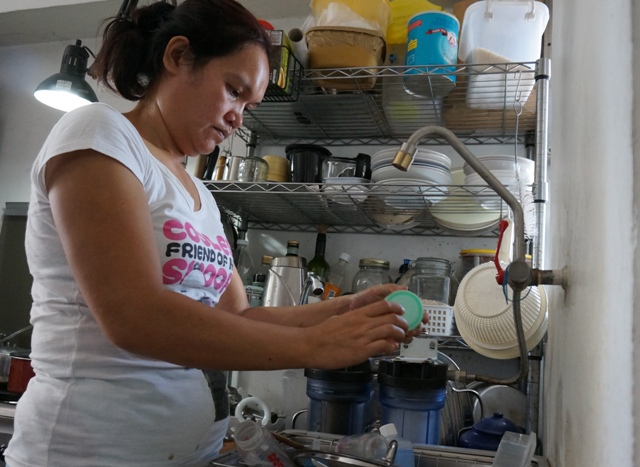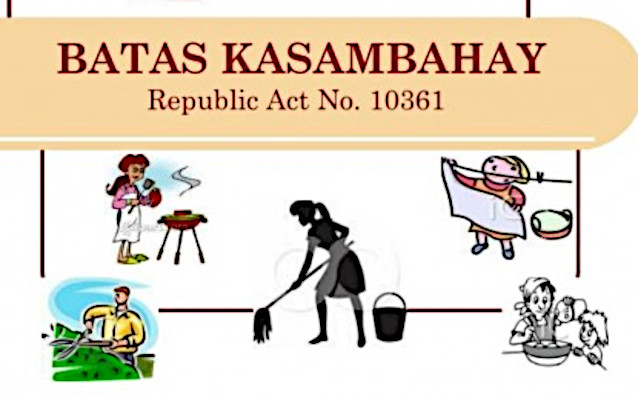By VINCE NONATO
Photos by DANIEL ABUNALES
She’s been housekeeper for 23 years, but for the first time this year Gigi Sacare might just be receiving benefits on top of her pay.
Sacare, 35, migrated from Davao to Metro Manila and has been working as a domestic helper since she was 12. Today, May 1, she and thousands of other house helpers will be celebrating their first Labor Day as official members of the country’s workforce.
The recent passage of Republic Act No. 10361, also called Batas Kasambahay or the Domestic Workers Act, has given Sacare and many others the chance to assert their right to better welfare and treatment. The law was signed in January, while its implementing rules and regulations were approved on April 25, expected to be released on May 10.
But even with a law, it may take some time before helpers can enjoy the full benefits as most of them do not have papers, even as basic as a birth certificate. In most cases, employers usually do not ask for proper documentation and do not give out contracts, exposing helpers to maltreatment and abuse.
“Ngayon ko lang naisipan na gusto kong [mag-SSS]. Noon, hindi ko pa alam yun. (It was only recently that I have thought of availing benefits from the Social Security System. I never knew about it),” Sacare said.
It was Angelica Carballo, her employer since 2011, who told Sacare about the new law, which requires employers to have their helpers avail of social welfare benefits like the SSS and Philhealth, the national health insurance program.
Without the proper documents, however, Sacare might have to wait a little longer. Sacare doesn’t have a birth certificate registered with the National Statistics Office, a requirement in processing transactions with the government.
Basic paperwork
Lilibeth Masamloc, an advocate for the rights of domestic workers, said domestic workers like Sacare who do not have the proper papers can still apply for late registration with the nearest Local Civil Registry Office.
“Before hiring them, advise them to secure their Birth certificate. Actually during the SSS orientation, if the domestic worker doesn’t have a birth certificate, she can bring along with her other pertinent documents,” she advised.
To avail of Philhealth coverage, Masamloc said baptismal certificates could be used in place of birth certificates.
All this would be new for domestic workers like Sacare, who’s been employed only through referrals.

“Wala namang nagtatanong na amo (No employer has ever asked for documents),” she said.
Masamloc, who was once a helper when she was 13, said what’s good about the law is that it recognizes that “domestic work is work and domestic workers are workers. “
“The state gives recognition to the contribution of domestic workers to the engine of the economy,” she added.
The law also pegs their minimum wage at the same rate as other workers, and entitles them to the same benefits.
In the law, a kasambahay’s minimum monthly wage ranges from P1,500 in provinces to P2,500 in cities. It may even go as high as P5,000 depending on the person’s training and experience. The law also requires employers to give out contracts.
Benefits of law
But even without the law, there are employers like Carballo who make sure helpers are treated well. Sacare said that Carballo pays for her fare when she asks for a leave to go home. She also gets days off from housekeeping and babysitting.
Sacare’s 22-year-old sister, however, is not as lucky with her employer of four years, who has refused to give SSS benefits, 13th month pay and even refuses to cover expenses when she falls ill.
“Magpagamot siya, sarili niyang pera (If she needs medical treatment, she has to spend her own money),” she said, remembering the time her sister got sick with dengue.
Sacare said that at times, it’s really up to the employer.
The good thing about the Kasambahay law is that it “provides grounds to protect” both the employer and the employee, Masamloc said.
She also suggested that the government should hold massive awareness campaigns and encourage domestic workers to join associations where they can be better informed of their rights.
(Vince Nonato is a University of the Philippines journalism student who is writing for VERA Files as part of his internship.)


